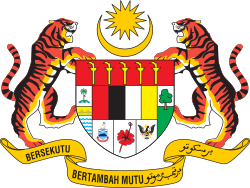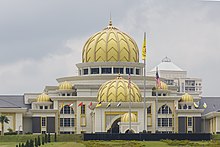Politics of Malaysia takes place in the framework of a federal representative democratic constitutional monarchy, in which the Yang di-Pertuan Agong is head of state and the Prime Minister of Malaysia is the head of government. Executive power is exercised by the federal government and the 13 state governments. Legislative power is vested in the federal parliament and the 13 state assemblies. The judiciary is independent of the executive and the legislature, though the executive maintains a certain level of influence in the appointment of judges to the courts.
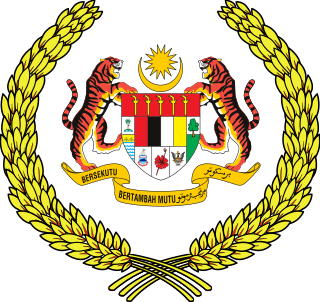
The Yang di-Pertuan Agong, also known as the Supreme Head of the Federation, the Paramount Ruler or simply the Agong, and officially known as the King of Malaysia, is the constitutional monarch and head of state of Malaysia. The office was established in 1957, when the Federation of Malaya gained independence from the United Kingdom. The Yang di-Pertuan Agong is elected by the Conference of Rulers, comprising the nine rulers of the Malay states, with the office de facto rotated between them, making Malaysia one of the world's few elective monarchies.
In Malaysia, the Yang di-Pertua Negeri is a constitutional title given to the head of state in states without a ruler, namely: Penang, Malacca, Sabah and Sarawak. This is in contrast to a Ruler which is a constitutional title given to states with hereditary monarchies, namely: the Sultans of Johor, Kedah, Kelantan, Pahang, Perak, Selangor and Terengganu; the Raja of Perlis: and the Yang di-Pertuan Besar of Negeri Sembilan.
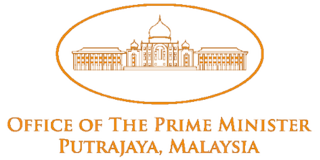
The Prime Minister of Malaysia is the head of government of Malaysia. The prime minister directs the executive branch of the federal government. The Yang di-Pertuan Agong appoints the prime minister as a member of Parliament (MP) who, in his opinion, is most likely to command the confidence of a majority of MPs. This person is usually the leader of the party winning the most seats in a general election.

The Parliament of Malaysia is the national legislature of Malaysia, based on the Westminster system. The bicameral parliament consists of the Dewan Rakyat and the Dewan Negara. The Yang di-Pertuan Agong (King), as the head of state, is the third component of Parliament.

The Dewan Rakyat is the lower house of the bicameral Parliament, the federal legislature of Malaysia. The chamber and its powers are established by Article 44 of the Constitution of Malaysia. The Dewan Rakyat sits in the Houses of Parliament in Kuala Lumpur, along with the Dewan Negara, the upper house.
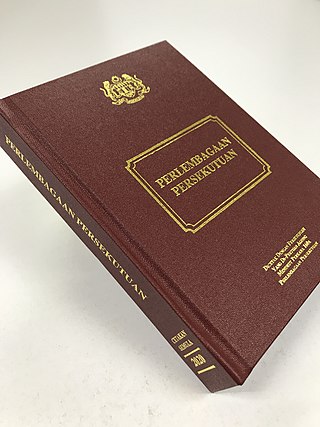
The Federal Constitution of Malaysia, which came into force in 1957 as the Constitution of the Federation of Malaya and was amended in 1963 to form the Constitution of Malaysia, is the supreme law of Malaysia and contains a total of 183 articles. It is a written legal document influenced by two previous documents, the Federation of Malaya Agreement 1948 and the Independence Constitution of 1957. The Federation was initially called the Federation of Malaya and it adopted its present name, Malaysia, when the states of Sabah, Sarawak and Singapore became part of the Federation. The Constitution establishes the Federation as a constitutional monarchy, having the Yang di-Pertuan Agong as the Head of State with largely ceremonial roles. It provides for the establishment and organisation of three main branches of the government: the bicameral legislative branch called the Parliament, which consists of the House of Representatives and the Senate ; the executive branch led by the Prime Minister and his Cabinet Ministers and the judicial branch headed by the Federal Court.
The states and federal territories of Malaysia are the principal administrative divisions of Malaysia. Malaysia is a federation of 13 states (Negeri) and 3 federal territories.

The Dewan Negara is the upper house of the Parliament of Malaysia, consisting of 70 senators of whom 26 are elected by the state legislative assemblies, with two senators for each state, while the other 44 are appointed by the Yang di-Pertuan Agong (King), including four who are appointed to represent the federal territories.
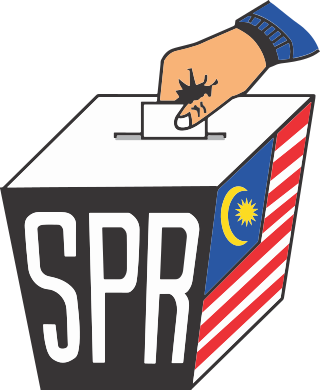
The Election Commission of Malaysia, abbreviated SPR or EC, is a commission set up for ensuring fair and equitable operations in undertaking the elections in Malaysia. The agency falls under the purview of the Prime Minister's Department.
The Cabinet of Malaysia is the executive branch of the Government of Malaysia. Led by the Prime Minister, the cabinet is a council of ministers who are accountable collectively to the Parliament. According to the Article 43 of the Federal Constitution, members of the Cabinet can only be selected from members of either houses of Parliament. Formally, the Yang di-Pertuan Agong appoints all Ministers on the advice of the Prime Minister. The constitution is amended by repealing the Clause (8) of Article 43, enabling a person who is a member of State Legislative Assembly to continue to serve even while serving as a minister or deputy minister in the cabinet. Ministers other than the Prime Minister shall hold office during the pleasure of the Yang di-Pertuan Agong, unless the appointment of any Minister shall have been revoked by the Yang di-Pertuan Agong on the advice of the Prime Minister but any Minister may resign from office. In practice, the Yang di-Pertuan Agong is obliged to follow the advice of the Prime Minister on the appointment and dismissal of ministers.

The following outline is provided as an overview of and topical guide to Malaysia:
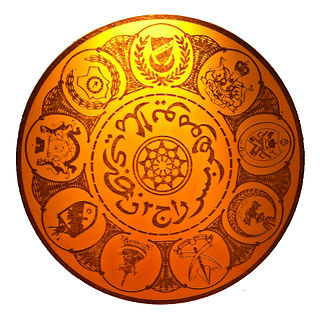
The monarchies of Malaysia refer to the constitutional monarchy system as practised in Malaysia. The political system of Malaysia is based on the Westminster parliamentary system in combination with features of a federation.
The state governments in Malaysia are the governments ruling the 13 states in the federation of Malaysia. All 13 states adopts the Westminster Parliamentary system and each has a unicameral state legislative assembly. Each of the States of Malaya is run by an EXCO, while Sabah and Sarawak have their respective Cabinet and Ministry. The state government structure in all 13 states is similar to the government system of the federal government of Malaysia and that the state legislatures consist of only a single chamber.

The Malaysia Bill is an annex of the Agreement relating to Malaysia between United Kingdom of Great Britain and Northern Ireland, Federation of Malaya, North Borneo, Sarawak and Singapore. It gave effect to the Agreement where that the British colonies of North Borneo, Sarawak and the State of Singapore should be federated with the existing States of the Federation of Malaya and the name of the federation should be Malaysia, and the Federal constitution wherewith to amend and adopt the Constitution of the Federation of Malaya so as to provide for the admission of those States. it adopted its present name, the name of the Constitution of the Federation of Malaya should be changed into Constitution of Malaysia.
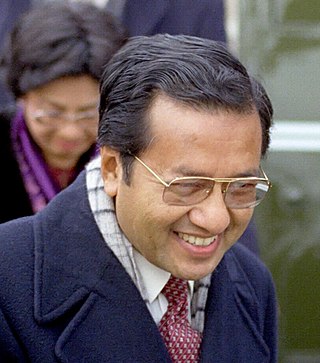
Mahathir Mohamad formed the second Mahathir cabinet after being invited by Tuanku Ahmad Shah to begin a new government following the 22 April 1982 general election in Malaysia. Prior to the election, Mahathir led the first Mahathir cabinet, a coalition government that consisted of members of the component parties of Barisan Nasional. It was the 10th cabinet of Malaysia formed since independence.
In Malaysian political and constitutional terminology, a caretaker government is a government of Malaysia during a period that starts when the parliament is dissolved by the Yang di-Pertuan Agong prior to a general election, and continues for a period after the election, until the next cabinet is appointed. A caretaker government is expected to conduct itself in accordance with a series of well-defined conventions that are administered by the Prime Minister's Department, although there is no law compelling the caretaker government to do so.

The 2020–2022 Malaysian political crisis was triggered after several Members of Parliament (MPs) of the 14th Malaysian Parliament changed party support, leading to the loss of a parliamentary majority, the collapse of two successive coalition governments, and the resignation of two Prime Ministers. The political crisis culminated in a 2022 snap general election and eventual formation of a coalition government.

The Muhyiddin cabinet was formed on 10 March 2020, nine days after Muhyiddin Yassin was appointed as the 8th Prime Minister of Malaysia and dissolved 17 months and 6 days later on 16 August 2021, the day when Muhyiddin submitted his resignations as PM and of this cabinet. It was the 21st cabinet of Malaysia formed since independence. This cabinet was also known as the Perikatan Nasional Cabinet (PN-Cabinet) which combined 15 political parties from the Perikatan Nasional (PN) component parties, with Barisan Nasional (BN) component parties, Gabungan Parti Sarawak (GPS) component parties and United Sabah Party (PBS) as allied partners providing confidence and supply.
